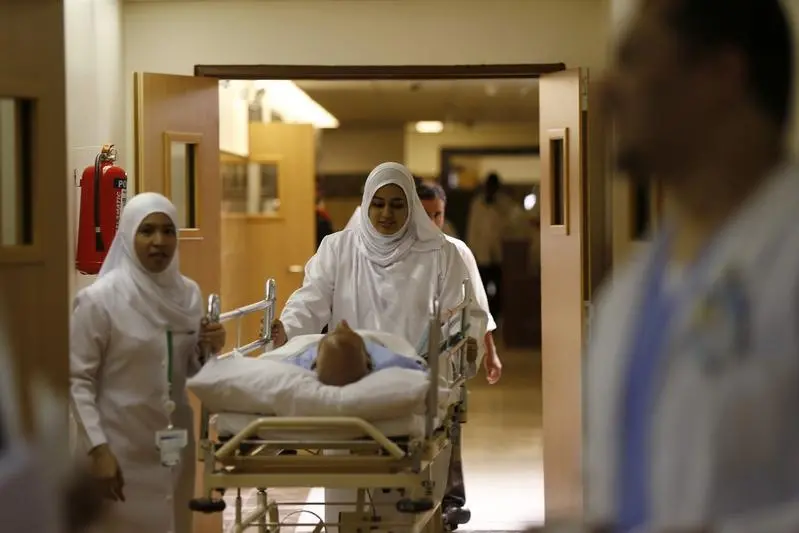PHOTO
11 August 2017
Sean Cronin
London - New hospital beds in Jeddah and Riyadh were not enough to offset the impact of rising costs as Amanat Holdings reported a fall in second-quarter profit.
The Dubai-listed group, which invests in health care and education, said second quarter profit fell 20 percent to 11.9 million dirhams ($3.2 million) in a filing to the Dubai Financial Market on Thursday.
Overall income also declined to about 14.2 million dirhams from 15.5 million dirhams from the year earlier period.
Still, the group said it generated increased income from health care associates which was driven mainly by International Medical Center, a hospital that serves Saudi Arabia’s Western Region.
It acquired the 300-bed hospital in December 2016 and has been working to add beds and expand polyclinic and day case surgery centers around Jeddah this year.
Amanat runs a second acute care operation which also has its flagship facility in Jeddah.
It focuses on patients who require extended care as well as home care services for people who are no longer suited to a traditional hospital setting.
The unit, which is known as Sukoon International Holding, was acquired by Amanat in 2015.
The health care company said that it was working on “cost improvements” at Sukoon during the first half of the year.
“With increased demand for quality health care and education services in the Gulf Cooperation Council (GCC), I believe Amanat has the capital, expertise and passion to become the partner of choice to support the investment demands needed to further develop these sectors,” said Faisal Bin Juma Belhoul, Chairman of Amanat.
Rapid population growth across the Middle East has increased demand for school places and hospital beds over the last decade. But a regional economic slowdown that was triggered by a weakening oil prices has put pressure on both sectors as governments roll back subsidies and expatriates depart as companies cut jobs.
Since Amanat was founded it has invested more than 740 million dirhams in health care and education acquisitions in both the UAE and Saudi Arabia – countries where there has been rapidly rising demand for new schools and hospitals.
In a Feb. 2017 report, the management consultancy Strategy& said it expected total GCC health care spending to reach $69 billion by 2020.
“The demand for new hospitals, clinics and medical services is growing, and GCC governments are expected to spend and invest significantly more in the sector by 2020,” said Strategy& Principal Nikhil Idnani.
Amanat’s main education unit is Taaleem, which is one of the UAE’s largest providers of primary and secondary education.
Taaleem, which was acquired by Amanat in April 2016, generated 6.2 million dirhams in income for the group in the first half of the year.
It has a portfolio of 11 schools and nurseries with an enrolment of around 9,000 students.
Sean Cronin
London - New hospital beds in Jeddah and Riyadh were not enough to offset the impact of rising costs as Amanat Holdings reported a fall in second-quarter profit.
The Dubai-listed group, which invests in health care and education, said second quarter profit fell 20 percent to 11.9 million dirhams ($3.2 million) in a filing to the Dubai Financial Market on Thursday.
Overall income also declined to about 14.2 million dirhams from 15.5 million dirhams from the year earlier period.
Still, the group said it generated increased income from health care associates which was driven mainly by International Medical Center, a hospital that serves Saudi Arabia’s Western Region.
It acquired the 300-bed hospital in December 2016 and has been working to add beds and expand polyclinic and day case surgery centers around Jeddah this year.
Amanat runs a second acute care operation which also has its flagship facility in Jeddah.
It focuses on patients who require extended care as well as home care services for people who are no longer suited to a traditional hospital setting.
The unit, which is known as Sukoon International Holding, was acquired by Amanat in 2015.
The health care company said that it was working on “cost improvements” at Sukoon during the first half of the year.
“With increased demand for quality health care and education services in the Gulf Cooperation Council (GCC), I believe Amanat has the capital, expertise and passion to become the partner of choice to support the investment demands needed to further develop these sectors,” said Faisal Bin Juma Belhoul, Chairman of Amanat.
Rapid population growth across the Middle East has increased demand for school places and hospital beds over the last decade. But a regional economic slowdown that was triggered by a weakening oil prices has put pressure on both sectors as governments roll back subsidies and expatriates depart as companies cut jobs.
Since Amanat was founded it has invested more than 740 million dirhams in health care and education acquisitions in both the UAE and Saudi Arabia – countries where there has been rapidly rising demand for new schools and hospitals.
In a Feb. 2017 report, the management consultancy Strategy& said it expected total GCC health care spending to reach $69 billion by 2020.
“The demand for new hospitals, clinics and medical services is growing, and GCC governments are expected to spend and invest significantly more in the sector by 2020,” said Strategy& Principal Nikhil Idnani.
Amanat’s main education unit is Taaleem, which is one of the UAE’s largest providers of primary and secondary education.
Taaleem, which was acquired by Amanat in April 2016, generated 6.2 million dirhams in income for the group in the first half of the year.
It has a portfolio of 11 schools and nurseries with an enrolment of around 9,000 students.
© Arab News 2017





















